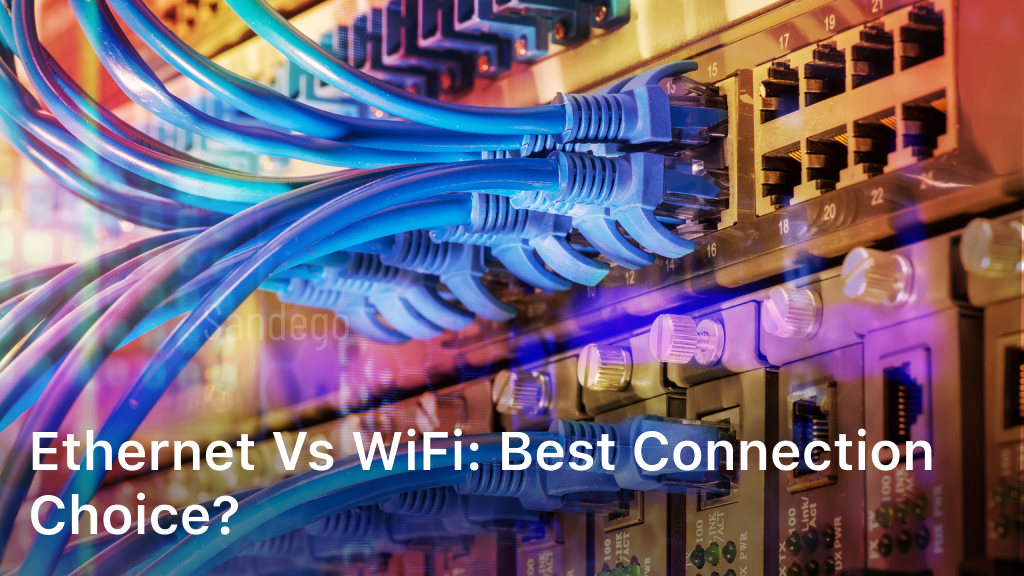Welcome to our in-depth comparison of ethernet and WiFi connections. If you’ve ever wondered about the differences between these two popular connection types, you’ve come to the right place. In this article, we will explore the key dissimilarities between ethernet and WiFi, helping you make an informed decision about the best connection choice for your specific needs.
So, what exactly is the difference between ethernet and WiFi? Let’s dive in!

Speed and Latency
When it comes to choosing between ethernet and WiFi connections, speed and latency are key considerations. Speed refers to how quickly data can be transmitted, while latency refers to the delay or lag in data transmission.
Ethernet connections, which use physical cables, generally offer faster speeds and lower latency compared to WiFi connections. This is because ethernet connections provide a dedicated and stable connection, leading to faster data transfer rates. However, it’s important to note that the actual speed and latency can vary depending on various factors such as the quality of cables, network congestion, and distance.
Speed
In terms of speed, ethernet connections are known to provide faster and more consistent speeds compared to WiFi. Ethernet cables, such as Cat5e or Cat6, can support higher data transfer rates, ranging from 100 Mbps to 10 Gbps or even more.
On the other hand, WiFi speeds can be influenced by several factors, including the distance from the router, the number of devices connected to the same network, and interference from other electronic devices. WiFi connections typically provide slower speeds compared to ethernet, especially in scenarios where multiple devices are connected simultaneously or when there are physical obstructions between the device and the router.
Latency
Latency, also known as ping, refers to the time it takes for data packets to travel from one point to another. Lower latency is desirable, especially in applications where real-time interaction is crucial, such as online gaming and video conferencing.
Ethernet connections generally offer lower latency compared to WiFi. This is because WiFi signals can be affected by interference and network congestion, leading to potential delays in data transmission. On the other hand, ethernet connections provide a more direct and stable connection, resulting in lower latency and a better overall user experience.
| Connection Type | Speed | Latency |
|---|---|---|
| Ethernet | Generally faster | Lower latency |
| WiFi | Slower, especially with multiple devices or physical obstructions | Potential higher latency due to interference and congestion |
Reliability and Security
When it comes to choosing a connection type, reliability and security are two crucial factors to consider. Ethernet and WiFi differ significantly in terms of their reliability and security features.
Reliability
Ethernet connections are known for their superior reliability compared to WiFi. Ethernet uses physical cables to establish a direct connection between your device and the router, ensuring a stable and consistent network performance. This wired connection minimizes the risk of signal interference, making it highly reliable even in crowded environments.
On the other hand, WiFi connections rely on wireless signals, which can be affected by various factors such as walls, distance from the router, and interference from other devices. This can lead to potential drops in signal strength and reliability, particularly in larger spaces or areas with multiple wireless networks.
Security
When it comes to security, ethernet offers several advantages over WiFi connections. Ethernet connections are generally considered more secure due to their physical nature. Since the connection is established through physical cables, it is much harder for unauthorized users to gain access to the network. This makes ethernet an ideal choice for scenarios where data privacy and security are top priorities.
WiFi connections, though convenient, can be more vulnerable to security risks. Wireless signals can be intercepted by unauthorized individuals, potentially allowing them to gain access to your network and sensitive information. However, modern WiFi networks can be secured using encryption protocols such as WPA2 or WPA3, which significantly enhance security levels.
The table below summarizes the reliability and security features of ethernet and WiFi:
| Aspects | Ethernet | WiFi |
|---|---|---|
| Reliability | Highly reliable, stable connection through physical cables | Reliability can be affected by signal interference and distance from the router |
| Security | Less susceptible to unauthorized access due to physical connection | Potential vulnerability to unauthorized access, but can be secured with encryption |
Gaming Performance and Streaming
Gamers and streamers know the importance of a stable and fast internet connection. But when it comes to gaming and streaming, which connection type is better – ethernet or WiFi? Let’s delve into the factors that can impact gaming performance and streaming quality on each connection type.
1. Ethernet for Gaming
Ethernet connections are often considered the optimal choice for gaming. These wired connections offer faster speeds, lower latency, and more consistent performance compared to WiFi. With ethernet, you can experience minimal lag and a reliable connection, resulting in better gameplay and smoother online experiences.
2. WiFi for Gaming
While ethernet is preferred for gaming, WiFi can still be a viable option depending on your circumstances. Modern WiFi technology has improved significantly, providing faster speeds and reduced latency compared to older WiFi standards. If you have a high-quality WiFi router and minimal interference, you can still enjoy smooth gaming experiences. However, keep in mind that WiFi connections are more susceptible to interference and packet loss, leading to potential lag spikes and interruptions during gameplay.
3. Ethernet for Streaming
When it comes to streaming, ethernet connections are highly recommended. Streaming involves transmitting large amounts of data in real-time, and a stable and high-speed connection is essential for uninterrupted streaming sessions. Ethernet offers a more reliable connection, ensuring smooth streaming without buffering or dropouts. Additionally, ethernet connections are less prone to interference from other devices, providing consistent and high-quality streaming performance.
4. WiFi for Streaming
While ethernet is ideal for streaming, WiFi can still deliver good results depending on your specific setup. If you have a strong WiFi signal and minimal interference, you can achieve satisfactory streaming quality. However, keep in mind that WiFi connections might experience occasional buffering or quality fluctuations, especially in crowded areas or with multiple devices connected to the same network. If you’re a professional streamer or prioritize top-notch streaming quality, ethernet is the more reliable choice.
Overall, ethernet connections offer the best gaming performance and streaming quality due to their faster speeds, lower latency, and greater reliability. WiFi can be a viable option depending on your circumstances, but for optimal results, especially in competitive gaming or professional streaming scenarios, ethernet is the recommended choice.
| Ethernet | WiFi | |
|---|---|---|
| Speed | Very High | High |
| Latency | Low | Higher than Ethernet |
| Reliability | High | Moderate |
| Interference | Minimal | Potential |
| Streaming Quality | Superior | Good |
| Gaming Performance | Optimal | Satisfactory |
Conclusion
After exploring the key differences between ethernet and WiFi connections, it is clear that ethernet offers several advantages over WiFi.
One of the main advantages of ethernet is its speed. Ethernet connections provide faster speeds compared to WiFi, making it ideal for tasks that require high bandwidth, such as transferring large files or streaming high-definition videos.
Another advantage of ethernet is its reliability. Unlike WiFi, which can be affected by interference from other devices or obstacles, ethernet connections offer a more stable and consistent connection. This reliability is particularly crucial for online gaming, video conferencing, or other activities that demand uninterrupted performance.
When it comes to security, ethernet also has the upper hand. While WiFi networks can be vulnerable to hacking attempts, ethernet connections offer a more secure and private communication channel. This makes ethernet a preferred choice for businesses or individuals who prioritize data security and confidentiality.
Despite these advantages, it is worth noting that WiFi still has its place in certain scenarios. WiFi provides the convenience of wireless connectivity, making it suitable for mobile devices and areas where wiring may be impractical. However, it is essential to be aware of the potential disadvantages of relying solely on WiFi, such as slower speeds, higher latency, and potential security risks.
In conclusion, ethernet offers significant advantages in terms of speed, reliability, and security over WiFi. However, the choice between ethernet and WiFi ultimately depends on your specific needs and circumstances. Consider the nature of your tasks, the importance of stability and security, and the convenience of wireless connectivity before making a decision.
FAQ
What is the difference between ethernet and WiFi?
Ethernet is a wired connection that uses cables to connect your device to the internet, while WiFi is a wireless connection that uses radio waves to transmit data. Ethernet typically offers faster speeds and lower latency compared to WiFi.
How does the speed and latency compare between ethernet and WiFi?
Ethernet generally provides faster speeds and lower latency compared to WiFi. This means that tasks such as downloading large files or streaming high-definition videos may be quicker and smoother on an ethernet connection.
Which connection type is more reliable and secure, ethernet or WiFi?
Ethernet is known to be more reliable compared to WiFi. Wired connections are less prone to interference and signal disruptions, making them a preferred option for critical applications. Additionally, ethernet offers enhanced security as it is not susceptible to wireless hacking attempts like WiFi.
Should I choose ethernet or WiFi for gaming and streaming?
For gaming and streaming purposes, ethernet is generally preferred over WiFi. Ethernet connections provide more stable and consistent performance, reducing the chances of lag or buffering during gameplay or streaming sessions. This is especially important for competitive gaming or streaming high-quality media content.
What are the advantages of ethernet over WiFi, and what are the disadvantages of relying solely on WiFi?
The advantages of ethernet over WiFi include faster speeds, lower latency, increased reliability, and enhanced security. On the other hand, relying solely on WiFi can result in potential disadvantages such as slower speeds, higher latency, decreased reliability, and vulnerabilities to wireless hacking. It’s important to consider your specific needs and requirements when choosing between ethernet and WiFi connections.






